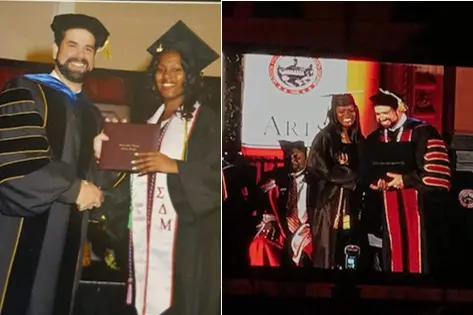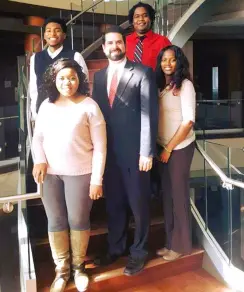When I first walked into that boardroom as a student trustee, I instantly felt the eyes follow me and the weight of 5,000 voices on my shoulders—and my own journey as a Black woman and first-generation college student. There I was, elected by my peers through the Student Government Association (SGA), sitting at a table with institutional leaders and board trustees who made decisions that would shape our small urban community college. From the glass windows where you could see the entire campus to the formal agendas, none of it was familiar territory for someone who had never navigated higher education before. But that's exactly why I needed to be there.
In the picture at left, you'll see me (at right) with our 2015 president, Richard A. Carvajal, at Darton State College. Little did I know then that his leadership would capture my entire undergraduate journey in the most unexpected way. My role as student trustee was not just to make my résumé look good. I attended every monthly board meeting, participated in discussions about budget allocations and policy changes, and cast votes on matters that would directly affect my peers. I represented students at governing events where decisions were made about financial aid, campus resources, academic programs, and student services.
Over time, I had to get used to the idea that if I do not speak up, what was I elected for? So, I got comfortable raising my hand to speak, and I carried the conversations of concerns shared in SGA meetings from the student lens. Without a student trustee and without that regular insight from those of us living the college experience daily, boards can easily slip into focusing solely on business matters. Budgets, buildings, curriculum, and evaluation matter, but so do the students who are getting by with the minimum and juggle full-time jobs with full course loads, individuals who need mental-health resources, and who are the first in their families to pursue a postsecondary education.
Being a Black woman and a first-gen student meant I understood what was at stake on multiple levels. I knew what it felt like to navigate a system without guidance, to question if I belonged in those spaces, to fight for opportunities that others took for granted. That perspective made me become more reflective about prioritizing myself and my education. When institutional leaders discussed "student success initiatives," I could only speak to what success actually looked like for students like me and the barriers that stood in the way. Advocacy was not always comfortable. Speaking up meant potentially being seen as difficult. As a Black woman in leadership, I was often hyperaware of how I was perceived: too aggressive, too passionate, doing too much. It meant preparing for every meeting because I could not afford to be dismissed. It meant learning to translate student needs into the language of policy and institutional priorities. But every time a trustee leader paused and nodded or said, “That is a good way to think about it,” I knew it was worth it.

Here's where the story gets better: I transferred to Valdosta State University to earn my bachelor’s degree in Spanish languages and culture, and guess who became president there? Dr. Carvajal in 2016. The same leader I worked with at Darton State College now presided over my graduation at Valdosta State. So, the pictures at right capture both moments, me in my cap and gown with President Carvajal at both institutions. It felt like coming full circle, the interconnected nature of our educational journeys. In September 2025, Dr. Carvajal was appointed president of California State Polytechnic University, Humboldt, by the California State University board of trustees. As of this writing, he will serve as president of Valdosta State University through January 2026.
This journey didn't end with graduation; it evolved into pursuing higher education further.
My experiences as a student trustee, as a Black woman navigating predominantly white institutional spaces, led me to research. Specifically, to me-search. I have learned that the most powerful research often begins with our own stories. Me-search is about turning our lived experiences into frameworks for understanding the experiences of others who share similar identities and challenges. When I engage with research, I am not just collecting data, I am honoring narratives that have been historically overlooked and not centered in academic research. My personal narrative isn't separate from my scholarly work; it is the foundation of it. It gives me insight into the questions that matter and the cultural contexts that shape student experiences. The participants in my research are not subjects; they are co-creators in telling a story that needs to be told, a story I am positioned to understand because I have lived it too.
This experience taught me that representation matters, not just in theory, but in practice. A seat at the table means nothing if you do not use your voice. For first-gen students, for Black women, for anyone who has been told they do not belong in leadership spaces, finding that voice will open doors. I left that student trustee role knowing I had helped keep our board connected to what mattered most: the students whose lives would be changed by the decisions made in those meetings. I walked away with something invaluable: the confidence that my voice as a Black woman deserved to be heard at the highest levels.
Your story is your strength. The boardroom, the graduation stage, and every space in between needs exactly what you bring.
Gabrielle Haggins is an OCCRL research assistant.
